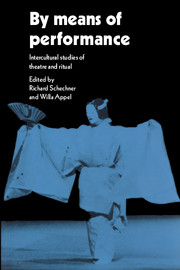Book contents
- Frontmatter
- Contents
- List of figures
- Notes on contributors
- Concerning Victor Turner
- Introduction
- 1 Are there universals of performance in myth, ritual, and drama?
- 2 Magnitudes of performance
- 3 Liminality: a synthesis of subjective and objective experience
- 4 The Yaqui deer dance at Pascua Pueblo, Arizona
- 5 A Yaqui point of view: on Yaqui ceremonies and anthropologists
- 6 Performance of precepts/precepts of performance: Hasidic celebrations of Purim in Brooklyn
- 7 The significance of performance for its audience: an analysis of three Sri Lankan rituals
- 8 What does it mean to “become the character”: power, presence, and transcendence in Asian in-body disciplines of practice
- 9 Korean shamans: role playing through trance possession
- 10 The practice of noh theatre
- 11 The profanation of the sacred in circus clown performances
- 12 Ethnographic notes on sacred and profane performance
- 13 The spatial sense of the sacred in Spanish America and the American South and its tie with performance
- 14 Space and context
- 15 The transformation of consciousness in ritual performances: some thoughts and questions
- 16 Universals of performance; or amortizing play
- Appendix
- Bibliography
- Index
1 - Are there universals of performance in myth, ritual, and drama?
Published online by Cambridge University Press: 05 June 2012
- Frontmatter
- Contents
- List of figures
- Notes on contributors
- Concerning Victor Turner
- Introduction
- 1 Are there universals of performance in myth, ritual, and drama?
- 2 Magnitudes of performance
- 3 Liminality: a synthesis of subjective and objective experience
- 4 The Yaqui deer dance at Pascua Pueblo, Arizona
- 5 A Yaqui point of view: on Yaqui ceremonies and anthropologists
- 6 Performance of precepts/precepts of performance: Hasidic celebrations of Purim in Brooklyn
- 7 The significance of performance for its audience: an analysis of three Sri Lankan rituals
- 8 What does it mean to “become the character”: power, presence, and transcendence in Asian in-body disciplines of practice
- 9 Korean shamans: role playing through trance possession
- 10 The practice of noh theatre
- 11 The profanation of the sacred in circus clown performances
- 12 Ethnographic notes on sacred and profane performance
- 13 The spatial sense of the sacred in Spanish America and the American South and its tie with performance
- 14 Space and context
- 15 The transformation of consciousness in ritual performances: some thoughts and questions
- 16 Universals of performance; or amortizing play
- Appendix
- Bibliography
- Index
Summary
In this essay I will discuss what I think is a characteristic developmental relationship from ritual to theatre, and I will lay out the relationship of both to social drama. The figures in this chapter express schematically some of these connections. I have argued that every major socioeconomic formation has its dominant form of cultural-aesthetic “mirror” in which it achieves a certain degree of self-reflexivity. Nonindustrial societies tend to stress immediate context-sensitive ritual; industrial pre-electronic societies tend to stress theatre, which assigns meaning to macroprocesses – economic, political, or generalized familial problems – but remains insensitive to localized, particularized contexts. Yet both ritual and theatre crucially involve liminal events and processes and have an important aspect of social metacommentary. In many field situations I have observed in markedly different cultures, in my experience of Western social life, and in numerous historical documents, I have clearly seen a community's movement through time taking a shape which is obviously “dramatic.” It has a proto-aesthetic form in its unfolding – a generic form like the general mammalian condition that we still have with us throughout all the global radiation of specific mammalian forms to fill special niches. As detailed in my earlier writings, in the first stage, Breach, a person or subgroup breaks a rule deliberately or by inward compulsion, in a public setting. In the stage of Crisis, conflicts between individuals, sections, and factions follow the original breach, revealing hidden clashes of character, interest, and ambition.
Information
- Type
- Chapter
- Information
- By Means of PerformanceIntercultural Studies of Theatre and Ritual, pp. 8 - 18Publisher: Cambridge University PressPrint publication year: 1990
Accessibility standard: Unknown
Why this information is here
This section outlines the accessibility features of this content - including support for screen readers, full keyboard navigation and high-contrast display options. This may not be relevant for you.Accessibility Information
- 93
- Cited by
